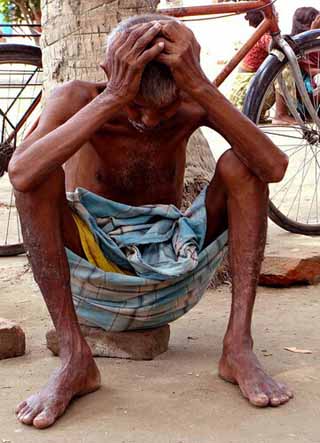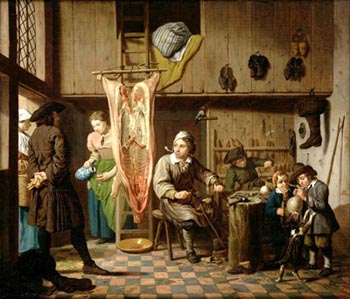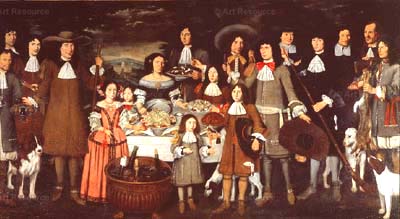 |
Organic Society
A Participative Society
Plinio Corrêa de Oliveira
A participative society is one without the tendency to concentrate all of the power, prestige, influence and money in the hands of a few with everyone else having little or nothing, like the societies of almost all the pagan states until the coming of Our Lord Jesus Christ.

A millenary misery in India is a consequence of the lack of an organic society |
Even after the Incarnation and Redemption of mankind, many societies continued to follow that pagan pattern - even to this day. For instance, India – to the degree it is not imitating the West – is not a participative society. On the one hand, there is a Maharaja living in a dream palace, and on the other, the populace that surrounds him sitting in the dirt watching the sacred cows pass, forbidden to touch them. They have lived in that situation of servitude, ignorance and misery for one thousand years. From this people a dynasty does not emerge.
In contrast, the participative society is a living body with a hierarchy that tends to make all the parts of the social body proportionately increase, both materially and spiritually. The greater the differentiation, the greater the wealth, honors, power and influence of the entire body.
This happens in such a way that one can say that a woodcutter is the king of his family, just as one can say that the King himself shares characteristics of the people. The King is pleased to be called the father of the fathers, just as the woodcutter is happy to be called the king of his family.
Should the King pass by a gathering where the patriarch of a family of shoemakers would be telling the children the history of their family, the King would never think to laugh and say: “How ridiculous for this man to pretend to have a dynasty of shoemakers. Dynasties are just for us, the nobles.” The opposite was true. The King would stop and be interested in knowing the rich details of that history.
Every modest old family had its family history book reporting the events of its simple existence: “On such-a-such a day our little Joan fell down the stairs and broke her finger, and would not stop crying. My wife Christina remembered an old remedy of her grandmother that used spider webs, and she applied it to the finger of the suffering child, who stopped crying. Shortly she had recovered and was able to help again in the housework.”
This little episode entered the history of the family. Years later they would read that story one evening around the fireplace. Joan would be a young lady now, and they would rejoice together remembering how quickly her finger had healed. Someone might suggest that an herb be included in the remedy should it be needed for future incidents.

A cobbler with his family is at ease serving a magistrate |
This family chronicle, written by the head of the family and read aloud at times, was a factor of unity for the family and affirmed their own special characteristics and customs. It also provided pleasure and entertainment for the family.
Someone might tell me: “I have more fun watching television.” I know that. The same person could also say that he considered it even greater fun to go out chasing women. But these are not pleasures for Catholics. We should not sip from these cups.
At times these chronicles would report the great events that the family witnessed. Let me imagine an entry that could well have been registered in the book of a peasant family in Northern France. The father would write:
“One evening at the end of January my family was gathered together and someone knocked on the door. I opened the small door-window to ask who was there. A man in an elegant cape told me, ‘I come to you on the part of the King of Scotland who has landed on the nearby beach. He had to flee from a revolution that deposed him, and his ship brought him to France. He is in need of shelter and information on the best road to take to Paris, where the King of France has invited him to stay.’
“Since no one knew where Scotland was, I invited the man to enter and explain it to us. The man told us that my house was the first house with a light he had found, and so he had knocked on our door.
“We quickly prepared a chair for the King and I went outdoors to welcome him to our home. After he entered we served him a strong hot wine mixed with honey and spices because it was a very cold night. He also ate some preserves we offered him. The members of our family served him with the greatest respect, trying to make his short stay as pleasant as possible. My two young sons fell to their knees in admiration before that high noble seated in our modest house.
“The King kindly asked about our family and work, and remained talking with us for some time. After he had supped and rested, he thanked us with great solemnity, stood up and left the house. Before he started on the road, he placed five gold coins in my hand. Later I realized his effigy was stamped on those coins.”
We understand that one episode like this would become a part of the family tradition for a long time to come. If future generations of that same family were to read that story 100 years later, it would still have a special relish and charm.

An extended family in Milan enjoys a simple banquet after the hunt
|
I offer this imaginary example to show how rich and long-lasting the traditions of a single family can be. This kind of family continuity leads to the creation of a small dynasty which lasts for many generations.
When a group of families like this lives close to one another, we have the germination of a small county. Many such counties constitute a province, and many provinces, a Kingdom. The whole constitutes a hierarchical society filled with life where each part has its own marked personality.
Such a scenario portrays a Nation as an ensemble of different intermediary bodies between the individual and the State. This constitutes the essence of the hierarchical character of an organic society, with its intrinsic participative character.
After many centuries it can happen that an old family of woodcutters has many members and relations, and its patriarch exercises a considerable influence in its county. That family is a social and political force. Its life and existence, its care to preserve its particular traditions give it a voice that influences the decisions of the county. This is the participation of a modest family that we praise and defend, born from an organic hierarchy.

Posted May 12, 2010

  | | Prof. Plinio |
Organic Society was a theme dear to the late Prof. Plinio Corrêa de Oliveira. He addressed this topic on countless occasions during his life - at times in lectures for the formation of his disciples, at times in meetings with friends who gathered to study the social aspects and history of Christendom, at times just in passing.
Atila S. Guimarães selected excerpts of these lectures and conversations from the trancripts of tapes and his own personal notes. He translated and adapted them into articles for the TIA website. In these texts fidelity to the original ideas and words is kept as much as possible.

Related Topics of Interest
 The Organic Formation of a Region The Organic Formation of a Region
 Different Types of Nobility Different Types of Nobility
 The City and its
Nobility The City and its
Nobility
 All Classes Should Have
Elites All Classes Should Have
Elites
 Restoring a Closed
Economy Restoring a Closed
Economy
 St. Thomas against
Distributism St. Thomas against
Distributism
 Distributists
Misleading Their Audience about Capitalism Distributists
Misleading Their Audience about Capitalism
 A Distributist Manifesto
Spiced with Communism A Distributist Manifesto
Spiced with Communism
 Socialism and Distributism in
Catholic Clothing Socialism and Distributism in
Catholic Clothing

Related Works of Interest
|
|
Organic
Society |
Social-Political | Home |
Books | CDs |
Search | Contact Us |
Donate

© 2002-
Tradition in Action, Inc. All Rights Reserved
|
 |
|